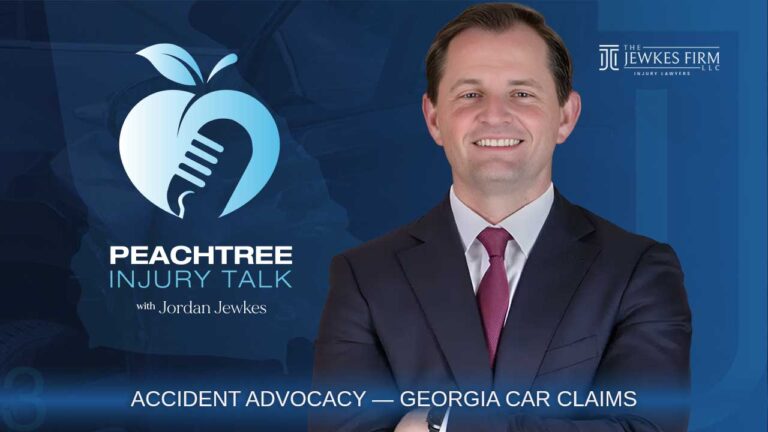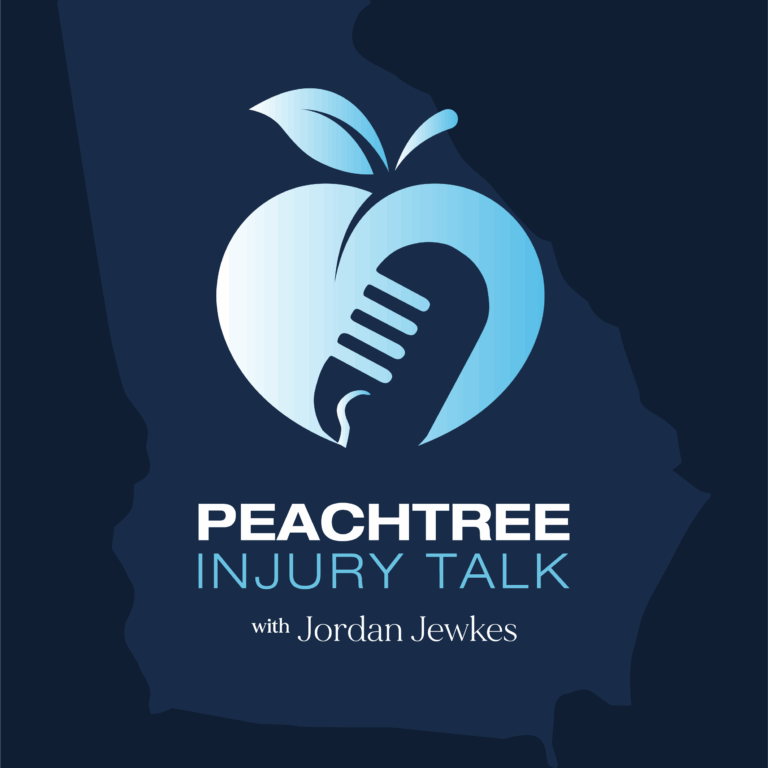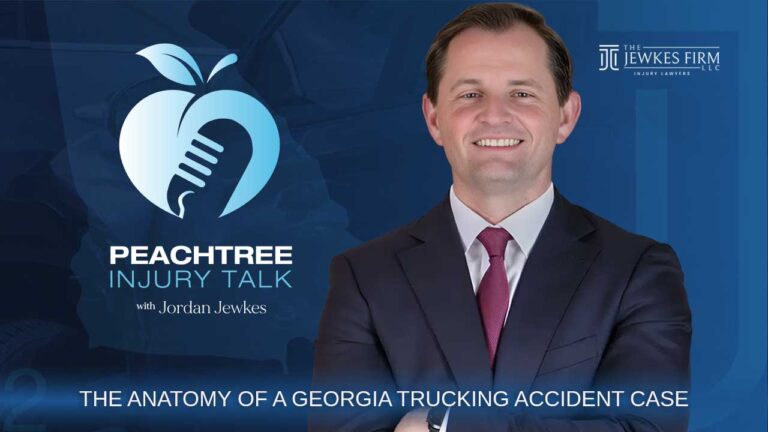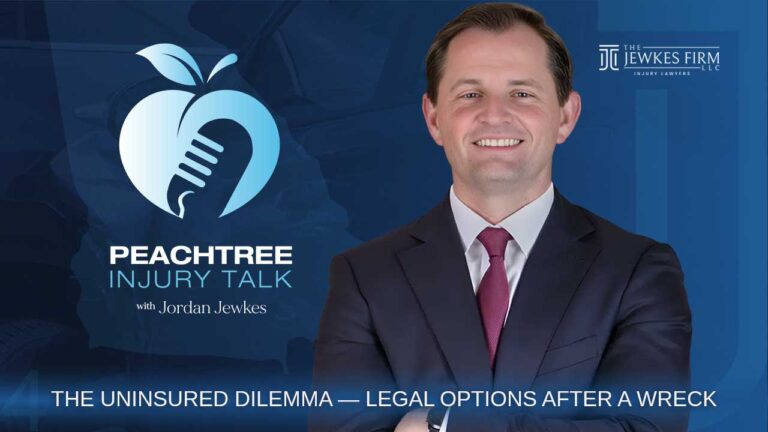
From Accident to Action — Georgia Injury Law
In this episode of Peachtree Injury Talk, attorney Jordan Jewkes discusses the critical aspects of personal injury law in Georgia. Jordan shares insights from his
Home | Podcasts | Peachtree Injury Talk | Accident Advocacy — Georgia Car Claims
Peachtree Injury Talk with Jordan Jewkes
In this episode of Peachtree Injury Talk, attorney Jordan Jewkes joins host Kevin Rosenquist to discuss the current state of personal injury law in Georgia, focusing on the alarming trends in severe car accidents. They explore how Georgia’s growing population heavy reliance on vehicles, and limited public transportation contribute to the increasing number of car wrecks. Jordan highlights the advancements in vehicle safety technology, such as automatic braking systems, while addressing the persistent issue of distracted driving. Tune in to gain valuable insights into the factors influencing car accidents in Georgia and what they mean for personal injury cases.
| 00:00 | Narrator: Welcome to Peachtree Injury Talk with attorney Jordan Jewkes. |
| 00:04 | Kevin Rosenquist: Hello and welcome to Peachtree Injury Talk with attorney Jordan Jewkes. I'm your host, Kevin Rosenquist, and today we are diving into the essentials you need to know about personal injury law in Georgia. Jordan, great to see you again. |
| 00:19 | Jordan Jewkes: Thanks, Kevin. Thanks for having me. |
| 00:20 | Kevin Rosenquist: How common are severe car accidents on Georgia roadways? Have you noticed any trends or increases in these accidents recently? |
| 00:30 | Jordan Jewkes: Yeah, that’s a really good question. I would say there are all different types of car wrecks happening on Georgia roads. Georgia’s a great place to live, and Atlanta’s a major hub, so our interstates are heavily used. The more dense the population, the more accidents we’re going to see. Unfortunately, the number of car wrecks isn’t going down—it’s heading in the other direction. |
| 01:04 | Kevin Rosenquist: Do you think that's just a population thing, or is it also a lack of public transportation? |
| 01:12 | Jordan Jewkes: It’s all of the above. The lack of public transportation definitely plays a role. One thing that’s improving is vehicle safety—automatic braking systems, sensors, things like that. But those systems can’t fully overcome distracted driving, especially with smartphones. People are still speeding, still driving distracted. As long as people keep doing that, accidents are going to continue. |
| 01:52 | Kevin Rosenquist: Technology can only do so much—it can’t change people’s habits. I’ve got to believe the number of accidents has skyrocketed with the rise of smartphones. |
| 02:04 | Jordan Jewkes: Absolutely. It’s tough to prove, but I’d bet almost every wreck involves a phone. Whether it’s checking Instagram, TikTok—whatever—people just can’t put them down. And no one’s going to admit it. They’ll say, “I was flipping the radio,” but that’s probably not the truth. Distracted driving from phone use is the number one cause of wrecks these days. |
| 02:38 | Kevin Rosenquist: Cell phones—good or bad. Definitely a topic for another episode. |
| 02:42 | Jordan Jewkes: Right! |
| 02:45 | Kevin Rosenquist: Can you explain the impact of severe injuries like traumatic brain injuries and spinal cord injuries resulting from car accidents? |
| 02:55 | Jordan Jewkes: Absolutely. Most wrecks cause less significant injuries, but we’ve seen people with serious spinal injuries from impacts where the car damage barely looks bad. It just shows how differently bodies can react to force. A typical wreck—where one moving object crashes into another—can lead to herniated discs in the spine, especially in the neck and lower back. Those injuries may never fully heal. Doctors don’t often say herniated discs will “just go away.” They may become less painful, but they don’t disappear. These injuries can cause lifelong pain. They’re best treated by orthopedists or neurosurgeons, not just chiropractors. Spine injuries affect everything—the brain, arms, legs, even fingers. It’s the central nervous system. And while not every injury leads to surgery, some people do eventually need it just to reclaim some quality of life. Often, it’s not even the dramatic pain that changes people—it’s the little things: not sleeping the same, back stiffness, not enjoying walks anymore. It may not sound like much, but it changes their daily lives in a big way. |
| 05:28 | Kevin Rosenquist: Anyone who follows sports knows how many athletes suffer lifelong back problems. |
| 05:39 | Jordan Jewkes: Yeah. Calvin Johnson, for example—he grew up right here in Tyrone, near our office. He was an incredible receiver, went to Georgia Tech, played for the Detroit Lions. He signed a big contract and then walked away from football due to back pain. These are world-class athletes in peak shape—and even they can’t withstand the long-term toll. So, imagine the average person in a wreck. We're even more vulnerable. |
| 06:56 | Kevin Rosenquist: What about traumatic brain injuries? How often do you see TBIs from car wrecks? |
| 07:03 | Jordan Jewkes: More and more often, especially because we're getting better at diagnosing them. There's a lot of compelling research showing that what we call “mild” traumatic brain injuries are common—especially in whiplash-type accidents. A TBI doesn’t mean the brain is visibly damaged—it could be a bruise or other subtle trauma. Your brain floats inside your skull, so a hard jolt—like hitting your head on the window or steering wheel—can cause it to hit the skull and get injured. Often, it's the people around the injured person who notice the change first. They’ll say things like, “Kevin just isn’t the same anymore.” Maybe you’re moody, forgetful, missing appointments, or not laughing at the same things. These personality changes, along with headaches and mental fog, are classic TBI symptoms. TBIs are serious, often permanent, and they have a major effect on a person’s life—and their legal case. |
| 09:28 | Kevin Rosenquist: What are some tactics insurance companies use to minimize payouts, and how can people protect themselves? |
| 09:37 | Jordan Jewkes: One of the most common tactics is to offer a quick settlement. And I promise you, one of the last things the insurance company wants you to do is talk to an attorney. A good attorney will explain your rights and walk you through your options. The insurance companies never encourage more treatment or help—they just say, “Here’s $1,000 and a few thousand more for medical expenses—just sign this release.” Once you sign, they’re off the hook. |
| 10:38 | Kevin Rosenquist: Do people fall for that often? |
| 10:41 | Jordan Jewkes: Way too often. And in Georgia, once you sign that release and accept the money, it’s very hard to undo. We’ve had some success getting around that, but it’s tough. If someone’s offering you money and a legal document to sign, talk to an attorney. We’ve told people in some cases, “You’re not that injured, and what they’re offering is fair—we won’t charge you anything.” But for most people, they don’t fully realize how hurt they are—and the insurance company is counting on that. |
| 11:34 | Kevin Rosenquist: How important is it to seek immediate medical care—even if you think the injury is minor? |
| 11:40 | Jordan Jewkes: It’s vital. Every case is different, but legally speaking, it’s critical to get checked out. You don’t have to go to a big ER—urgent care or even a chiropractor is fine. A lot of injuries don’t show up for 24–48 hours, especially spinal issues. If nothing else, go get checked out and document that you were in a wreck. That record could be crucial later. Have them do an exam, maybe an X-ray, and give you something for the pain. If you wake up stiff the next day, you’ll be glad you did. |
| 12:46 | Kevin Rosenquist: How do people manage vehicle repairs and medical treatment while going through all of this? |
| 12:55 | Jordan Jewkes: Great question. There are two claims: one for your vehicle, and one for your body. The goal of both is to return you to where you were before the accident. Cars can usually be repaired or replaced. Work with the at-fault driver’s insurance—or your own—to get your car fixed or declared a total loss. You can usually get a rental while that’s being handled. For your body, it’s about following doctor’s orders to get better. We tell clients: don’t settle until you’ve recovered or have a treatment plan. The worst thing is settling when you’re still hurt. I can get you money, but I can’t heal your body. So don’t rush it. |
| 14:54 | Kevin Rosenquist: What happens if the at-fault driver has little or no insurance? Can the victim still recover anything? |
| 15:04 | Jordan Jewkes: Usually, yes. But the best way to protect yourself is to carry uninsured motorist coverage. It’s very affordable and essential in Georgia, where a lot of people drive without insurance. The state minimum is only $25,000, which doesn’t go far if you’re seriously hurt. I recommend having uninsured motorist coverage equal to your liability limits. If you have $100,000 in liability, get $100,000 in uninsured motorist as well. It might increase your premium slightly, but it’s worth every penny. |
| 16:44 | Kevin Rosenquist: What advice would you give to someone who’s just been in a wreck? What should they do right away? |
| 16:52 | Jordan Jewkes: First, call 911 and get any necessary medical care. Then, document the scene—take photos, gather details, but don’t admit fault. Let the police investigate. After that, report the wreck to your insurance company and call a trusted personal injury attorney. A good attorney will investigate thoroughly, work with the police, and connect you with quality doctors. That’s how you protect yourself. |
| 17:58 | Kevin Rosenquist: Great advice. Thanks for tuning in to Peachtree Injury Talk with attorney Jordan Jewkes. For more information or to connect with Jordan, visit jewkesfirm.com (http://jewkesfirm.com)—that’s J-E-W-K-E-S firm dot com. And don’t forget to like, subscribe, and leave us a review in the comments. Jordan, always great to talk to you—thanks again for being here. |
| 18:17 | Jordan Jewkes: Likewise. Thanks, Kevin. |
| 18:18 | Narrator: Thanks for watching. Be sure to hit that like and subscribe button and leave us a review in the comments. |

Peachtree Injury Talk is a podcast by Kevin Rosenquist featuring legal insights and practical advice from Georgia-based attorney Jordan Jewkes. The show focuses on personal injury law, offering listeners expert guidance on navigating insurance claims, understanding legal processes, and protecting their rights after an accident. Each episode dives into real-life case examples, common challenges injured individuals face, and actionable tips for dealing with insurance companies and legal hurdles.
Episode Summary
In this episode, Jordan Jewkes explains the litigation process, why it can be time-consuming, and what injured victims should expect when filing a lawsuit. He covers the key stages of litigation, from filing a complaint to trial, and highlights why most cases settle before reaching court. Jordan also discusses the discovery process, depositions, mediation, arbitration, and the role of the judge throughout litigation. If you’ve ever wondered why legal battles seem to drag on, this episode breaks it all down in simple, understandable terms.
Timestamps
00:00 – Introduction to Peachtree Injury Talk with Jordan Jewkes
00:06 – Episode topic: Litigation process and timeline
00:25 – What is litigation and how does it differ from filing a claim?
01:01 – Why do some cases go to trial instead of settling?
02:06 – The role of risk assessment in settlements
03:32 – When does an attorney recommend going to trial?
05:24 – The discovery process: what it entails and why it takes time
06:52 – What happens during depositions?
08:04 – Settlements can happen at any point in litigation
09:19 – How insurance companies assess credibility in depositions
10:22 – Timeline from discovery to trial
11:58 – Court scheduling and trial delays
12:08 – Mediation vs. Arbitration: What’s the difference?
13:58 – How judges influence the litigation process
16:30 – Closing thoughts and how to connect with Jordan Jewkes
About the Show
Welcome to Peachtree Injury Talk with Jordan Jewkes, where attorney Jordan Jewkes gives injured victims a voice and provides strong advocacy against a complicated legal system. Each episode, Jordan and host Kevin Rosenquist break down essential legal topics to help listeners navigate personal injury claims, settlements, and litigation.

Accident Advocacy — Georgia Car Claims details the increasing frequency of severe car accidents on Georgia roadways is attributed primarily to population growth and high traffic density, especially around major hubs like Atlanta. The limited public transportation infrastructure further exacerbates reliance on personal vehicles, increasing accident risks. Although vehicle safety technologies such as automatic braking and sensors have improved, they cannot fully mitigate the dangers posed by human behaviors—particularly distracted driving caused by smartphones. Distracted driving remains the leading cause of car wrecks, with many drivers reluctant to admit phone use during accidents.
Serious injuries such as spinal cord damage and traumatic brain injuries (TBIs) often result from collisions, even when vehicle damage appears minor. Herniated discs in the neck and lower back are common and typically cause chronic pain impacting quality of life. Treatment usually involves specialists like orthopedists or neurosurgeons, and sometimes surgery. TBIs—often “mild” but serious—are increasingly diagnosed due to better medical awareness. These brain injuries manifest as headaches, mental fog, mood swings, and memory issues, profoundly affecting victims and complicating legal claims.
Jordan Jewkes warns that insurance companies frequently try to minimize payouts by offering fast settlements, urging accident victims to accept small sums and sign releases quickly. He advises against this, as signing releases usually prevents any further claims, which can be detrimental if injuries are more serious or long-lasting than initially apparent. Consulting a knowledgeable personal injury attorney is crucial to fully understand rights and options. Some cases might warrant accepting an offer, but most people underestimate their injuries, and insurers exploit that. Immediate medical evaluation is also vital—not only for health but for legal documentation—since symptoms of injuries such as spinal damage may take 24 to 48 hours to emerge.
Jewkes explains there are separate claims for vehicle damage and bodily injury. Victims should work with insurance companies—either the at-fault driver’s or their own—to repair or replace vehicles and often can get a rental car during this period. For bodily injuries, following medical treatment plans and waiting until recovery or a clear treatment strategy is established before settling claims is critical to ensure proper compensation.
Since many drivers in Georgia lack insurance, uninsured motorist coverage is essential. Jewkes recommends carrying uninsured motorist limits equal to liability coverage to maximize financial protection in case of accidents involving uninsured or underinsured drivers.
Finally, Jewkes advises those involved in an accident to first call 911 and seek medical care. Documenting the accident scene with photos and notes without admitting fault is essential. Reporting the claim to insurance and contacting a trusted personal injury lawyer soon after the accident are also key steps to ensuring adequate investigation, obtaining medical referrals, and protecting legal rights.
In summary, the episode provides a comprehensive guide to understanding personal injury law related to car accidents in Georgia, highlighting the growing prevalence of accidents influenced by human factors like distracted driving, the lasting impact of serious injuries, common insurance tactics, and practical advice for accident victims on how to safeguard their health and legal interests. For more information, reach out to The Jewkes Law Firm at (770) 771-5130.
Welcome to Peachtree Injury Talk—your essential podcast for navigating the often bewildering landscape of personal injury law. In each episode, join Attorney Jordan Jewkes as he unpacks the complexities surrounding your rights in the unfortunate event of an accident.
Through engaging dialogue and expert insights, Jordan demystifies legal jargon. He presents practical, applicable, and relatable scenarios that will resonate with listeners. Whether you’re dealing with the aftermath of a car accident, a slip and fall incident, or any other personal injury matter, Peachtree Injury Talk aims to empower you with the knowledge you need.
Each episode is designed to be accessible and informative. Thus, making it easier for you to understand the steps you should take to protect yourself and your interests. Jordan Jewkes shares real-life cases, common pitfalls to avoid, and tips on securing the compensation you deserve.
Additionally, the podcast fosters a community atmosphere where listeners can feel comfortable asking questions and seeking guidance. This supportive environment is a testament to The Jewkes Firm’s commitment to helping individuals understand their legal options.
So, whether you’re a seasoned listener or tuning in for the first time, prepare to arm yourself with valuable insights that can significantly influence your recovery journey. Tune in to Peachtree Injury Talk. Equip yourself with the vital information needed to navigate your rights confidently and get the support you deserve!
This show is designed to deliver general information regarding the law. Our guests will not provide tailored legal advice. If you have a personal issue and need legal support, get in touch with us for a free consultation with a Jewkes Firm attorney.
Subscribe to our newsletter for essential updates and expert legal advice.

In this episode of Peachtree Injury Talk, attorney Jordan Jewkes discusses the critical aspects of personal injury law in Georgia. Jordan shares insights from his

In this episode of Peachtree Injury Talk, attorney Jordan Jewkes discusses the critical aspects of trucking accident cases in Georgia. They explore the prevalence of

In this episode of Peachtree Injury Talk, attorney Jordan Jewkes discusses the critical topic of uninsured and underinsured motorists in Georgia. Jordan explains what uninsured